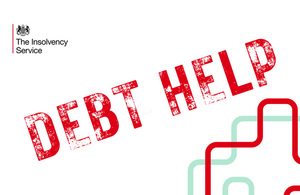‘Don’t feel alone’: find out the first steps in the journey out of debt
During Debt Awareness Week, we talk to Neil Sutton, a senior leader within the bankruptcy and Debt Relief Order teams at the Insolvency Service, about some of the options that can help people on their journey out of debt.

- There are solutions available to help people who have serious debts that they cannot pay
- Insolvency solutions include bankruptcy, Individual Voluntary Arrangements (IVAs) and Debt Relief Orders (DROs)
- We talk to a senior leader within the bankruptcy and Debt Relief Order teams at the Insolvency Service to find out more about different debt relief options
Dealing with problem debt can feel overwhelming, but there are solutions designed to help people who are facing insolvency.
Neil Sutton is a Senior Leader who oversees all the applications for bankruptcy and Debt Relief Orders that come into the Insolvency Service. His teams deal with applications for these debt solutions, alongside applications for the government’s debt respite scheme, Breathing Space.
He talks to us about the different options available which can set people on their journey out of problem debt.
Neil said:
The first step for people who are struggling to pay off their debts is to seek free, regulated debt advice. They will identify the solution that is best for them.
Sometimes this will be a formal solution, like bankruptcy or a Debt Relief Order. But a regulated debt adviser will make sure that whatever people decide will be the right solution for them.
Your first step is picking up the phone, getting on webchat or visiting a debt advice office, and having that conversation.
Formal debt solutions are legal processes which help people make a fresh start free of debt, such as Bankruptcy, Debt Relief Orders (DROs) and Individual Voluntary Arrangements (IVAs).
Once you are in one of these processes, the people you owe money to cannot take action against you to get you to repay them and you usually will not have to repay all the money you owe, although this will depend on your circumstances.
But entering one of these solutions is a big decision as the consequences can affect you both now and in the future, so seeking expert debt advice is vital to help you understand the possible implications
Neil said:
It can be difficult to see your way out of a debt cycle, and it’s absolutely not an easy step to take by yourself.
So working with debt advisers is important, to help you understand the implications of any solution you decide to enter.
The government also offers a scheme called Breathing Space, which is administered by the Insolvency Service. Breathing Space lasts for 60 days, during which the people you owe money to can’t take any action against you, and interest and charges are frozen. It allows you time and headspace so you can work with a debt adviser to plan a suitable financial solution.
Neil said:
Problem debt can impact people’s physical and mental health. Breathing Space allows you to turn off that noise and work with a debt adviser to explore suitable solutions for you.
Breathing Space itself is not a solution to debt, but a tool to help you deal with it. A debt adviser will make sure that it’s right for you.
During a Breathing Space, lots of people do budgeting with the help of their debt advisers, or see if they can access other benefits. If there’s a way forward that doesn’t involve insolvency solutions, that’s what debt advisers will help you look at.
As with DROs, the Breathing Space scheme is delivered in partnership with the debt advice sector.
“It’s everyone working together,” says Neil.
He adds:
The important message is don’t feel alone – there were more than 120,000 applications into the Insolvency Service for either Breathing Space, DROs, or bankruptcy last year.
It’s not an easy step, but if it’s the right thing for you, don’t be put off by the name of the process – it’s one of the solutions there to help you deal with debt.
We see a lot of positive impact for those who find a debt solution that is sustainable for them. Many people can start again with their finances. These solutions are all about a financial fresh start at the end of the day.
Further Information:
-
People seeking any of these options should first speak to a debt adviser – which can be accessed free of charge via MoneyHelper.
- For details of options for dealing with debt, see Options for dealing with your debts: Overview - GOV.UK (www.gov.uk)
- Check how you can pay off debt and contact a free, expert debt adviser here: Check how you can deal with your debts - GOV.UK (www.gov.uk)
- For more information about DROs, see Options for dealing with your debts: Debt Relief Orders - GOV.UK (www.gov.uk)
- For more information about IVAs, see What you need to know about Individual Voluntary Arrangements (IVAs) - Insolvency Service (blog.gov.uk)
- For more information about bankruptcy, see: What you need to know about bankruptcy - Insolvency Service (blog.gov.uk)
- If you are in Scotland there are different options available. For details see here: Accountant in Bankruptcy - Scotland’s Insolvency Service - Explore Various Debt Solutions (aib.gov.uk)
- The government announced changes to DROs in the Spring Budget in March 2024, to make sure that those who most need support can access help. Chancellor Jeremy Hunt announced that the £90 fee for DROs would be abolished from 6 April 2024.